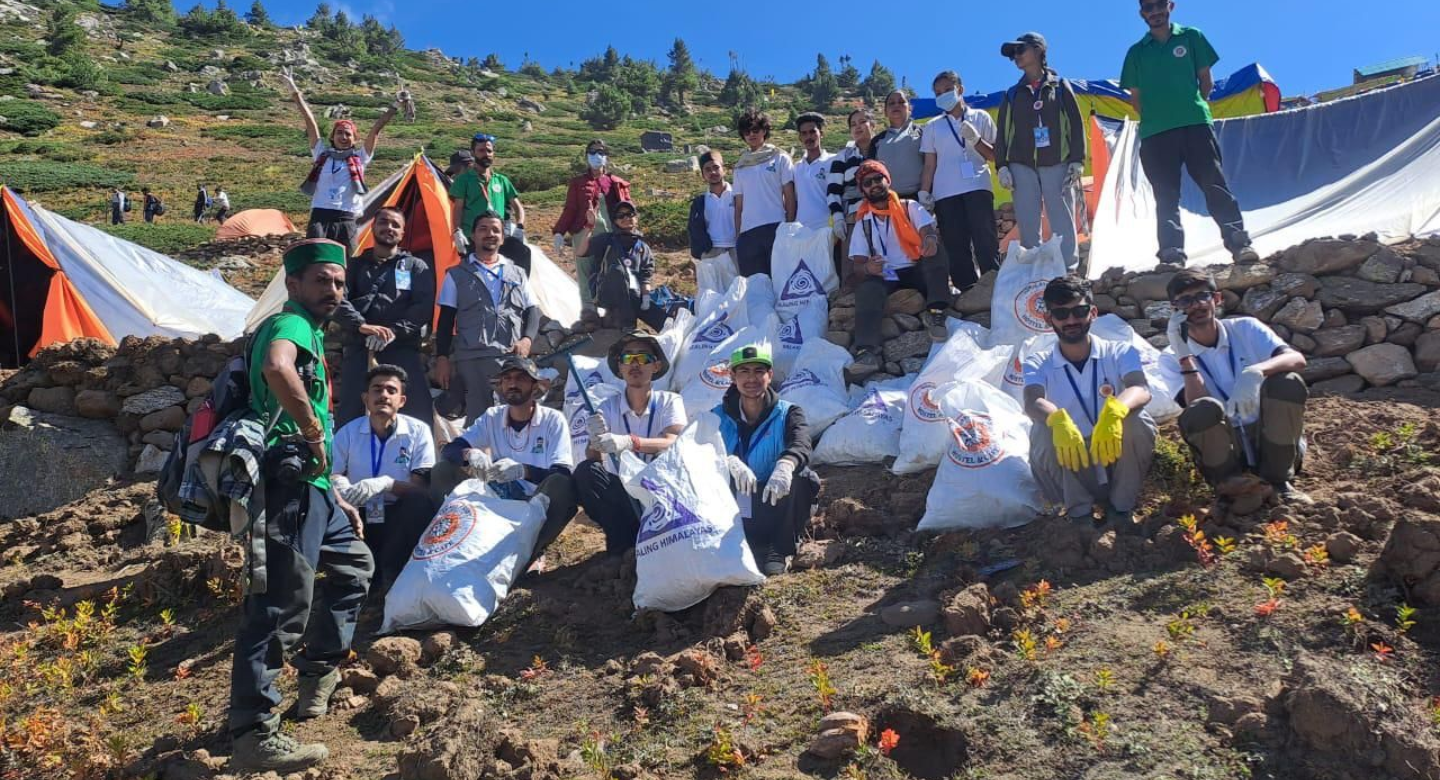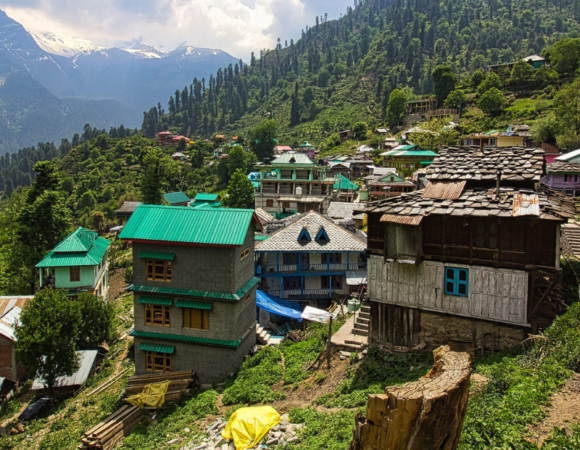The Story of Pradeep Sangwan’s Fight Against Waste in the Mountains
Discover how Pradeep Sangwan transformed from military aspirant to environmental champion, founding the Healing Himalayas Foundation to combat mountain waste pollution. Learn about his journey collecting 1,633+ tonnes of waste, building sustainable waste management systems, and creating a movement that’s protecting India’s most iconic landscapes.
Table of Contents
ToggleThe majestic Himalayas, with their snow-capped peaks and pristine landscapes, have long captured the imagination of travelers and adventure seekers worldwide. However, this natural wonder faces a growing threat from tourism-related pollution. Environmentalist Pradeep Sangwan witnessed this disturbing reality firsthand during his treks across Himachal Pradesh, where he observed plastic bottles, food wrappers, and waste desecrating the once-pristine mountain trails.
From Military Aspirant to Environmental Advocate

Pradeep Sangwan’s journey began far from environmental activism. Raised in the structured environment of Military School Ajmer, he initially aspired to serve in the Indian Army. However, his frequent treks through Himachal Pradesh revealed a problem that would ultimately redirect his life’s purpose.
During these expeditions, Sangwan was deeply troubled by the stark contrast between the Himalayas’ natural beauty and the garbage that increasingly marred the landscape. Rather than merely lamenting the situation, he took direct action. What started as a personal mission to pick up trash along hiking trails gradually evolved into something much larger as he recognized the systemic nature of the problem.
The Birth and Growth of Healing Himalayas Foundation
In 2016, Sangwan formalized his efforts by establishing the Healing Himalayas Foundation (HHF). The organization began modestly with weekend clean-up drives involving Sangwan’s friends and local volunteers. These initial efforts grew into a structured environmental movement through persistence and vision.
The foundation’s core mission expanded beyond clean-ups to include educating tourists and locals about waste management and creating sustainable waste ecosystems throughout the Himalayan region. This comprehensive approach addresses both immediate pollution concerns and long-term sustainability challenges.
Measurable Impact
The Healing Himalayas Foundation has achieved remarkable results through its focused efforts:

- Collection of over 1,633 tonnes of waste from mountain trails and villages
- Organization of more than 1,000 clean-up drives across various Himalayan regions
- Development of 8 Material Recovery Facilities (MRFs) in remote mountain locations
- Engagement of volunteers across 10,000 kilometers of Himalayan terrain
- Recognition at the national level, including a feature in Prime Minister Narendra Modi’s ‘Mann Ki Baat’ radio program
Beyond Clean-Ups: A Comprehensive Waste Management Approach
What distinguishes HHF from many environmental initiatives is its focus on creating complete waste management solutions rather than just conducting periodic clean-ups. The foundation works to establish sustainable waste ecosystems in high-altitude tourist zones that often lack proper infrastructure.
The HHF waste management model includes:
- Strategic placement of Material Recovery Facilities in remote regions like Kinnaur, Spiti, and Kullu
- Implementation of source segregation practices to separate recyclable materials at collection points
- Partnerships with waste management agencies to ensure proper processing of collected materials
- Avoidance of environmentally harmful disposal methods such as landfills and open burning, which are particularly damaging in fragile mountain ecosystems
The foundation’s ultimate goal is to transform waste from an environmental burden into a resource through proper collection, segregation, and recycling.
Facing Ongoing Challenges

Despite significant progress, the scale of the challenge remains immense. As Sangwan often acknowledges, “It will take a lifetime to clean the Himalayas.” Tourist destinations like Manali, Rohtang Pass, and Kheerganga attract millions of visitors annually, many of whom lack awareness about responsible waste disposal or face inadequate infrastructure for proper waste management.
To address these persistent challenges, HHF employs a multi-faceted approach:
- Conducting 40-50 organized clean-up treks each year in heavily affected areas
- Building relationships with local communities and panchayats (village councils) to ensure local ownership of waste management initiatives
- Providing specialized training to volunteers in sustainable practices and waste management techniques
- Expanding public awareness through educational workshops, social media campaigns, and school programs
Vision for a Circular Economy
Sangwan’s vision extends beyond waste collection to the creation of a circular economy model for the Himalayan region. This ambitious goal involves establishing a zero-waste framework where every popular trekking route incorporates:
- Systematic auditing of incoming waste to identify problem areas and materials
- Strategically placed educational signage to inform tourists about responsible practices
- Accessible recycling stations with clear segregation guidelines
- Empowered local communities serving as environmental stewards
This comprehensive approach aims to transform the Himalayas into a living demonstration of climate resilience and responsible tourism, where waste is minimized and properly managed from the outset.
Expanding Reach: The Chardham Initiative
Building on its success in Himachal Pradesh, HHF is now extending its efforts to the sacred Chardham pilgrimage routes, beginning with Kedarnath. These spiritually significant sites face severe environmental pressure from the millions of pilgrims who visit annually. By bringing its waste management expertise to these areas, HHF aims to preserve both the natural environment and the spiritual sanctity of these important religious destinations.
The Call to Action
The work of Healing Himalayas Foundation underscores an important message: environmental protection requires collective responsibility. Those who enjoy the mountains have a duty to protect them. Sangwan encourages everyone to participate in this effort through various means:
- Volunteering for clean-up treks organized by HHF
- Practicing waste minimization during mountain travels
- Taking personal responsibility for waste by carrying it back down the trails
- Raising awareness among fellow travelers and community members
- Supporting organizations that address mountain waste management through donations or other contributions
Sangwan’s Environmental Philosophy
At the heart of Healing Himalayas Foundation is Sangwan’s deep reverence for the mountain ecosystem. “I consider the Himalayas sacred,” he explains. “We must promote ethical traveling by respecting the land and its people.”
In an era when climate change threatens ecosystems worldwide, Sangwan’s approach demonstrates how individual dedication can catalyze meaningful environmental action. His willingness to walk 10,000 kilometers to clean mountain trails exemplifies the commitment required to address our most pressing environmental challenges.
The story of Pradeep Sangwan and Healing Himalayas Foundation serves as a powerful reminder that environmental stewardship begins with personal responsibility and can grow into a movement capable of protecting even the world’s most magnificent natural treasures.Retry
Explore the Journeys of Other Hero’s
Aadavi: The World’s First Carbon-Neutral Baby
Radhe Shyam Bishnoi: The Guardian of the Great Indian Bustard
Patanjali Jha – Creating Food Forests for Livelihood & Ecology




